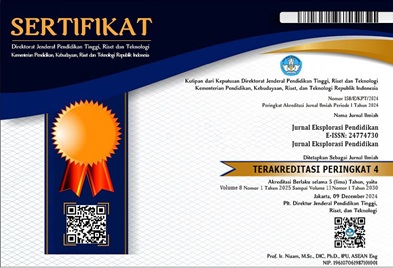PENGARUH PENERAPAN BERMAIN PERAN MAKRO TERHADAP KEMANDIRIAN ANAK USIA DINI KELAS B DI TK AISYIYAH BUSTANUL ATHFAL III
Kata Kunci:
Bermain Peran Makro, KemandirianAbstrak
Penelitian ini bertujuan untuk mengetahui: (1) Gambaran penerapan bermain peran pada anak usia dini kelas B (2) Gambaran kemandirian anak usia dini kelas B sebelum dan setelah melakukan kegiatan bermain peran makro, dan (3) Pengaruh penerapan bermain peran makro terhadap kemandirian anak usia dini kelas B. Penelitian ini merupakan penelitian kuantitatif dengan metode eksperimen, jenis penelitian yaitu eksperimen semu (quasi eksperimen), desain rancangan penelitian Pretest-posttest Nonequivalent Control Group Design. Subjek dalam penelitian ini berjumlah 30 anak, terbagi dalam dua kelompok yaitu 15 anak kelompok eksperimen dan 15 anak kelompok kontrol. Teknik pengumpulan data menggunakan observasi dengan bantuan pedoman observasi untuk kemandirian anak usia dini. Analisis data menggunakan analysis covariance (ANCOVA) dengan bantuan program SPSS 16 for windows. Hasil penelitian menunjukkan bahwa (1) bermain peran makro anak menggunakan Pelengkapan bermain peran makro dibagi menjadi tiga, yaitu: a) Alat dan bahan main kerumah tanggaan, b) Alat dan bahan main keprofesian, c) Alat dan bahan main yang mendukung keaksaraan Aktivitas bermain peran dalam kalangan anak-anak sangat populer. (2) terdapat perbedaan nilai signifikansi kemandirian anak usia dini sebelum dan setelah diberi permainan peran makro, dan (3) ada pengaruh penerapan bermain peran makro terhadap kemandirian pada anak usia dini. Jadi dapat disimpulkan bahwa ada pengaruh penerapan bermain peran makro terhadap kemandirian anak usia dini kelas B.
This research aims to find out: (1) A description of the application of role playing in early childhood class B (2) A description of the independence of early childhood class B before and after carrying out macro role playing activities, and (3) The influence of the application of macro role playing on children's independence early age class B. This research is quantitative research with experimental methods, the type of research is quasi-experimental, Pretest-posttest Nonequivalent Control Group Design research design. The subjects in this study were 30 children, divided into two groups, namely 15 children in the experimental group and 15 children in the control group. The data collection technique uses observation with the help of observation guidelines for early childhood independence. Data analysis used covariance analysis (ANCOVA) with the help of the SPSS 16 for Windows program. The results of the research show that (1) children's macro role playing using macro role playing equipment is divided into three, namely: a) Household play tools and materials, b) Professional play tools and materials, c) Play tools and materials that support literacy Play activities The role among children is very popular. (2) there is a difference in the significance value of early childhood independence before and after being given macro role play, and (3) there is an influence of implementing macro role play on independence in early childhood. So it can be concluded that there is an influence of the application of macro role playing on the independence of early childhood children in class B.





